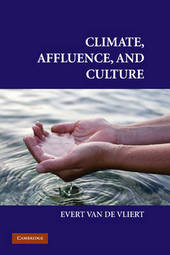
|
Climate, Affluence, and Culture
Hardback
Main Details
| Title |
Climate, Affluence, and Culture
|
| Authors and Contributors |
By (author) Evert Van de Vliert
|
| Series | Culture and Psychology |
|---|
| Physical Properties |
| Format:Hardback | | Pages:264 | | Dimensions(mm): Height 229,Width 152 |
|
| ISBN/Barcode |
9780521517874
|
| Classifications | Dewey:304.25 |
|---|
| Audience | | Postgraduate, Research & Scholarly | |
|---|
|
Publishing Details |
| Publisher |
Cambridge University Press
|
| Imprint |
Cambridge University Press
|
| Publication Date |
22 December 2008 |
| Publication Country |
United Kingdom
|
Description
Everyone, everyday, everywhere has to cope with climatic cold or heat to satisfy survival needs, using money. This point of departure led to a decade of innovative research on the basis of the tenet that climate and affluence influence each other's impact on culture. Evert Van de Vliert discovered survival cultures in poor countries with demanding cold or hot climates, self-expression cultures in rich countries with demanding cold or hot climates, and easygoing cultures in poor and rich countries with temperate climates. These findings have implications for the cultural consequences of global warming and local poverty. Climate protection and poverty reduction are used in combination to sketch four scenarios for shaping cultures, from which the world community has to make a principal and principled choice soon.
Author Biography
Evert Van de Vliert received his PhD from the Free University in Amsterdam in 1973, and held teacher and researcher positions at the same University, at the University of St Andrews in Scotland, and at the Royal Military Academy in The Netherlands. He served as Chairman of the Dutch Research Association of Social and Organizational Psychologists (1984-1989) and as Research Director of the Kurt Lewin Institute (1993-1996). He has published more than 200 journal articles, chapters, and books including Complex Interpersonal Conflict Behaviour: Theoretical Fontiers (Psychology Press, 1997). At present, he is Professor Emeritus of Organizational and Applied Social Psychology at the University of Groningen in The Netherlands, and Research Professor of Work and Organizational Psychology at the University of Bergen in Norway. Current research concentrates on cross-national psychology, with an emphasis on the impact of cold, temperate, and hot climate on national and organizational culture. In 2005, he received the Lifetime Achievement Award of the International Association for Conflict Management.
Reviews"There is no doubt that human societies have had to adapt to the weather they get, but theories about the link between climate and culture had so far never reached scientific status. By introducing affluence as a controlling variable, Evert Van de Vliert opens new perspectives to an old debate. His exploration into explaining the sources of some of the most fundamental differences between human cultures makes very good reading indeed." -Geert Hofstede, author of Culture's Consequences "Evert Van de Vliert presents an elegantly constructed account of his 15-year search for an adequate understanding of how climate conditions an impressively broad range of aspects of human behaviour. His groundbreaking elaboration of the links between the effects of climate and wealth is compelling. He provides a finely balanced account, integrating an accessible style with an ongoing thorough and fair-minded scrutiny of alternatives to his own perspective. This book is readable and timely, with important implications for the management of climatic change." -Peter B. Smith, Emeritus Professor of Social Psychology, University of Sussex, UK "...Climate, Affluence, and Culture draws our attention to ideas that are currently given cursory attention...This volume illustrates both a theoretical scaffold and an empirical footing...; we should hope for more books in this vein." -Brian H. Stagner, PsycCRITIQUES [January 6, 2010, Vol. 55, Release 1, Article 2] "...Climate, Affluence, and Culture would be of particular interest to those in organisational, social, or environmental psychology; it could also appeal to a broad range of academics and researchers in psychology, economics, management, cultural studies, or community development... Dr. Van de Vliert does call our attention to the daunting issues of climate change and poverty, and maintains that focusing on either exclusively will bring only limited improvements..." -E. Anne Marshall, University of Victoria, Canadian Psychology
|